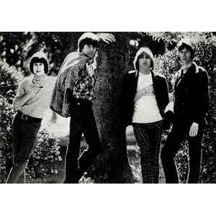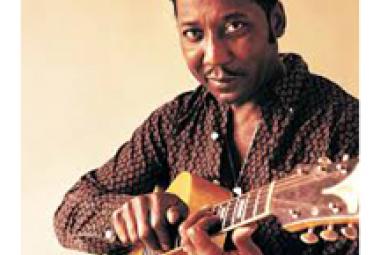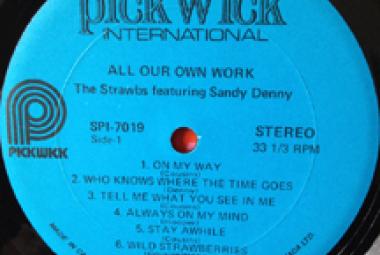I putzed around in my stacks looking for a band who was clearly influenced by the Rolling Stones – the way that my “two-fer” from a few months ago was, the Richmond Sluts and Big Midnight – but I couldn’t find one right away. So I decided to go back to the mother lode of English beat bands, the English Freakbeat series that Greg Shaw put together, where I have found several other previous UARB’s. Sadly, these albums (both vinyl and CD) have been out of print for many years, but there are used copies available here and there.
Anyway, I found one right away: THE PRIMITIVES. That’s the Primitives with the crazy hair in the middle of the cover of the English Freakbeat, Volume 4 CD; the caption inside the booklet says: “The Primitives get their hair done!”).
Unlike several other recent posts of mine where Allmusic really had almost nothing to contribute on the band that I was writing about, there is a long article about the Primitives by Bruce Eder – maybe the longest that I have seen on Allmusic for any of the UARB’s and UARA’s over the years. The opening remarks make it clear how great Eder thinks the band was:
“The Primitives were never, ever exactly a household name, even in Oxford, where they had a serious following as a club band – and that’s a reminder that some things in life and history, and even music, are just so unfair as to be unsettling. The Primitives [were] signed to Pye Records in 1964 [and] never found even a small national audience in England. . . . Castle Communications issued their catalog on CD in 2003. That CD was a delight and a vexation; it proved in the listening that these guys deserved a lot better than cult or footnote status, but it also brought home the unfairness inherent in their status. Even in their second, slightly more pop-oriented incarnation, when they were allowed to cut loose and be who and what they really were – a loud band without a lot of subtlety but power to spare and the sincerity to put over their music – they rated a place near the top of Pye Records’ roster and in the upper reaches of the British Invasion pantheon. Listening to the CD, this reviewer found himself pained, to the point of shedding a tear, over the fact that this band only got to leave 24 songs behind from its prime years. . . .
“[T]heir sound was very similar to the Pretty Things, rooted heavily in American R&B, and [lead singer Jay] Roberts was a serious, powerful shouter who could sound seriously, achingly raspy, rough, and growly, while the others played with virtually none of the niceties or delicacy that usually marred British attempts at the music.”
* * *
The band started out with the name the Rising Sons and gained renown in the clubs around their home town of Oxford for their strong R&B sound. After going by the surprising name of the Cornflakes for a time, they entered and won a local band competition in Northampton; the prize was a recording contract with Pye Records, home of Petula Clark, the Searchers, the Kinks, Status Quo, and other prime British artists, as well as past UARB the Soul Agents. The owners of the Plaza Theatre (where the contest was held) agreed to be their managers, and at that point, they changed their name to a more promising one, the Primitives.
Bandmembers in the Primitives at this point were Jay Roberts (lead vocals), Geoff Eaton (lead guitar), John E. Soul (rhythm guitar and harmonica), Roger James (bass guitar), and Mike Wilding (drums) – the latter gentleman is the son of Elizabeth Taylor and British actor Michael Wilding.
* * *
The first release by the Primitives was “Help Me” b/w “Let Them Tell”. Both sides of this monster single are included on the English Freakbeat, Volume 1 CD. Bruce Eder has this lavish description of the single in his Allmusic article:
“[The Primitives] could and should have been one of the top groups on the Pye label, based on their rough-and-ready debut ‘Help Me’, a cover of a Sonny Boy Williamson [II] number that was beautifully raw and authentic, and wonderfully intense across an astonishingly long three minutes and 39 seconds, [John E.] Soul’s harmonica and [Geoff] Eaton’s guitar keeping the verisimilitude right up there like a Chess Records session gone out of control, amid [Jay] Roberts’ ever more intense romantic lamentations. The group-authored B-side, ‘Let Them Tell’, was almost as much a showcase for the harmonica and rhythm section as for Roberts’ singing. Amazingly, that November 1964 release even made it out in America, as part of the very short-lived licensing agreement between Pye and Philadelphia-based Cameo-Parkway Records, which also issued the Kinks’ first U.S. single, before Pye headed for the greener pastures of Warner-Reprise.”
* * *
Like the band’s first record, the Primitives’ second single for Pye Records, “You Said” b/w “How Do You Feel” did not chart at all in the U.K. About the flip side, Bruce Eder notes: “[A] bluesy cut with a nice, choppy rhythm part, similar to what the Yardbirds did with ‘Here ’Tis’ or ‘Good Morning Little School Girl’ on-stage, only with better singing.”
Years later, word got out that, on both of the songs on this 45, the band’s lead guitarist Geoff Eaton was replaced with future Led Zeppelin star Jimmy Page, who was a prolific session guitarist in the early part of his career. As reported on popsike.com, the single has sold on eBay several times recently – for the equivalent of nearly $600 in one case – but oddly, this fact is not mentioned on any of the several items that I looked up on the website about this single.
“You Said” is included in the four-CD box set, Nuggets II: Original Artyfacts from the British Empire and Beyond, 1964–1969.
* * *
After two flops, the Primitives were feeling the pressure and reacted the way that many young bands do when this happens: They broke up, but they then reformed around a new lead singer, MAL RYDER. Ryder was already established in the British scene to some extent, having released four singles, so the band was redubbed Mal and the Primitives. In this new incarnation, John E. Soul stayed on for awhile as rhythm guitarist, and Jay Roberts became the bass guitarist, though Ryder indicates that Roberts began using his birth name Jeffrey Farthing; they were joined by Stuart Linnell on lead guitar and Mick Charleton on drums.
Singer and band combinations like this were fairly common in this era; past UARB the Soul Agents backed Rod Stewart during the first half of 1965 for instance. The backing band for the major English rock star Cliff Richard for many years was one of Britain’s top instrumental rock bands, the Shadows.
Billy J. Kramer with the Dakotas had numerous hit songs, including several Lennon/McCartney songs in Britain (Billy J. Kramer was also managed by Brian Epstein) and a major U.S. hit, “Little Children” in March 1964. They used “with” rather than “and” so as to keep separate identities for the singer and the band. The Dakotas by themselves had a hit instrumental in the U.K. with “The Cruel Sea”; for its U.S. release, it was retitled “The Cruel Surf” and was later covered by the Ventures. A curious song by the Dakotas called “7 Pounds of Potatoes” – “ . . . come between me and my love”, according to the lyrics – is included on English Freakbeat, Volume 2 (both the LP and the CD).
* * *
Here is the sum total of what Wikipedia has to say about Mal Ryder: “Mal Ryder (real name Paul Bradley Couling) (born 27 February 1944 in Llanfrechfa, Wales), is a British singer who became quite popular in Italy in the late 1960's, singing with Mal and the Primitives.” Italian Wikipedia though has sizable articles on the Primitives and also Mal (though surprisingly, there is not even a redirect from Mal Ryder).
As told on Mal Ryder’s website, www.mal.it, he first began playing with an Oxford band called the Meteors, but he jumped ship when asked to become the lead singer for a better local band, the Spirits (formerly known as the Beatniks). At that point, he began using his stage name, and the band became Mal Ryder and the Spirits.
This group made three singles from 1963 to 1965; a fourth single came out in Mal Ryder’s name individually. The first two 45’s, “Cry Baby” b/w “Take Over”, and the Bobby Goldsboro song “See the Funny Little Clown” b/w “Slow Down” were both produced by Peter Sullivan, who was also Tom Jones’ producer in that time period. The song that Greg Shaw thought was the strongest of these songs, “Forget It” (from November 1964) is included on two CD’s that I have, English Freakbeat, Volume 1 and English Freakbeat, Volume 4. As far as I am concerned, this bouncy R&B song with gruff, throaty vocals stacks up well with all of the Primitives material that I have heard.
* * *
Mal and the Primitives released just one single in Great Britain; “Every Minute of Every Day” b/w “Pretty Little Face” (the latter song written by bandmember John E. Soul) came out on Pye Records and also made no impact on the charts, like the earlier Primitives singles. About their final U.K. single, Bruce Eder has this praise: “They had a sound similar to the original group, although [Mal] Ryder was more of a dramatic singer, with an intense but less raspy delivery, more along the lines of a pop-soul vocalist like Chris Farlowe in his later 1960’s incarnation. ‘Every Minute [of Every Day]’ was a suitable A-side, similar to the group’s past work, while ‘Pretty Little Face’ was a lot more elegant than anything the original group had ever done, right down to the rather lyrical acoustic lead guitar doubling the opening piano part, similar to what the guitars on Bill Wyman’s ‘In Another Land’ [by the Rolling Stones] do on the middle and final verse of that song.”
In January 1966, they did a brief tour of Norway; as Mal Ryder tells it: “It seemed as though they hadn’t seen anything like us before; we felt like the Beatles.”
* * *
With their experience in Norway fresh on their minds, Mal and the Primitives decided to become one of several expatriate British rock bands that began to appear elsewhere in Europe by the mid-1960’s. The Downliners Sect and Alexis Korner followed a similar route. Perhaps the best known is the Sorrows; unable to follow up their 1965 hit “Take a Heart” in their home country (also included on Nuggets II), the group relocated to Italy in 1966 and recorded a highly esteemed Italian album in 1968, Old Songs New Songs. I have the first official reissue of Old Songs New Songs in 2009 on Wooden Hill Records; a second CD includes an early demo of the album plus a concert performance from 1980. A full cover by the Sorrows of the early Bee Gees hit “New York Mining Disaster 1941” is included on this early demo; only a single line from “New York Mining Disaster 1941” made it onto their album.
* * *
The Primitives was the winner among 30 rock bands who tried out with the Piper Club in Viareggio, Italy; after a short stint in France, they became the house band for the club beginning in July 1966. However, the two new bandmembers, Stuart Linnell and Mick Charleton both left the Primitives before they made the big move to Italy; Mark Sumner became the new lead guitarist.
The next two drummers for the Primitives made a name for themselves in later years. Dave Withers took Mick Charleton’s place in the band when they moved to Italy; according to Mal Ryder, he played on all of the early records that he made with the Primitives. He had the nickname Pique or Pick by then; Withers returned to England in 1969. In the late 1970’s, Pick Withers became the founding drummer with the British rock band Dire Straits, playing on their first four albums, including their #4 hit “Sultans of Swing”.
Pick Withers’ replacement in the Primitives, Robbie McIntosh had been playing with Brian Auger in Italy. McIntosh is from Scotland and later turned up in the Scottish band Average White Band, who had a million-selling hit in 1974 with “Pick up the Pieces”.
* * *
The relocation to Italy completely turned the fortunes of the Primitives around. Their appearances at the Piper Club turned them into stars, and they had huge record sales with their inventive Italian versions of English-language pop hits. Their first release in Italy was the major hit “Yeeeeeeh!” b/w “L’Ombra di Nessuno” (“The Shadow of None”), that is, the Rascals’ hit “I Ain’t Gonna Eat out My Heart Anymore” and the Four Tops song “Standing in the Shadow of Love”. “Yeeeeeeh!” is in the song listing on English Freakbeat, Volume 1 but is not actually on the CD.
The Primitives followed up this record with a second #1 hit in Italy, “L’Incidente” b/w “Johnny No” (listed on the 45 cover as “Johnny Nooooo!!!”). The “A” side is a version of the mostly instrumental hit “Soul Finger” by the Bar-Kays but with lyrics in Italian.
In 1968, the Primitives released a very rare album in Italy called Blow Up; the famous film by Italian film director Michelangelo Antonioni called Blow-Up had come out two years earlier. The album mostly features other Italian-language versions of American and British hit songs of the period. Their cover of the Strangeloves classic “Cara-Lin” from this album is included on the English Freakbeat, Volume 1 CD.
* * *
Of the songs that I have heard, the deceptively languid “Johnny No” is my favorite Primitives song and is included on the English Freakbeat, Volume 4 CD. The mix of foreign-language lyrics and an English tag line reminds me of the delightful 1980 song “Is Vic There?” by the British band Department S; I once had the “French version” of the song on a small punk rock CD that I stumbled on in a bargain bin. Evidently there was the regular English version and also an Italian version.
“Johnny No” is identified by Mal Ryder and others as being a cover of “Thunder and Lightning”; I have been unable to find the connection, however. Most of the songs called “Thunder and Lightning” that are mentioned on the Internet were released long after this song.
The only song that I know of which (barely) predates “Johnny No” is “Knock on Wood” (written by Eddie Floyd and Steve Cropper) that features the dramatic lyric: “It’s like thunder . . . lightning / The way you love me is frightening”. Otis Redding, David Bowie and Eric Clapton all recorded versions of this song; however, “Knock on Wood” doesn’t sound at all like “Johnny No” to me. (I finally thought to track it down through the songwriting credits; “Johnny No” is based on a 1963 Hoyt Axton song that I did not know called “Thunder N’ Lightnin’” that Jimmy Gilmer and the Fireballs also released as a “B” side).
* * *
While still being backed by the Primitives, Mal Ryder later moved to the forefront and began changing his sound. Though I haven’t seen this mentioned anywhere else, evidently he was using only his first name “Mal” during this period, according to Italian Wikipedia. Under this name, he had a million-selling record (a remarkable achievement in Italy) with his Italian version of the Bee Gees song “I’ve Gotta Get a Message to You” (released as “Pensiero d’Amore”). Mal Ryder also starred in four Italian movies and had a recording career spanning 37 years, including tours throughout Europe and also in America.
For Allmusic, Bruce Eder has this overview of their later years: “Unfortunately, as the records focused more and more on [Mal] Ryder, [the Primitives] became more of a kind of generic cover outfit for English-language songs of all genres. According to annotator David Wells, their R&B orientation gave way to pieces such as ‘Dear Mr. Fantasy’ [by Traffic] and ‘Song of a Baker’ [by Small Faces], but also ‘Love Letters in the Sand’ and (astonishingly) ‘Over the Rainbow’. Their edge was gone and, by the mid-’70s, so was the band.”
* * *
The 2003 CD on Castle called Maladjusted collects all or almost all of the songs by the Primitives plus some of Mal Ryder’s early recordings like “Forget It”. Besides the early singles on Pye Records mentioned already, there is an unreleased demo called “Oh Mary”, the entirety of the Italian album Blow Up, and a four-song EP that was released in France.
(May 2015)
* * *















